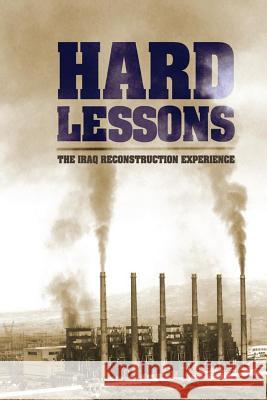Hard Lessons: The Iraq Reconstruction Experience » książka
Hard Lessons: The Iraq Reconstruction Experience
ISBN-13: 9781470108113 / Angielski / Miękka / 2009 / 486 str.
Hard Lessons reviews the Iraq reconstruction experience from mid-2002 through the fall of 2008. Like SIGIR's previous lessons learned reports, this study is not an audit. Rather, it arises from our congressional mandate to provide "advice and recommendations on policies to promote economy, efficiency, and effectiveness" in programs created for Iraq's relief and reconstruction. The report presents a chronological history of the reconstruction program, threading together a number of themes including: the enormous challenges that security problems posed for rebuilding efforts the dramatic and frequently reactive course-changes in reconstruction strategy the turbulence engendered by continual personnel turnover at every level the waste caused by inadequate contracting and program management practices the poor integration of interagency efforts caused by weak unity of command and inconsistent unity of effort. The text of this report-through vignette, interview, and factual detail-explicates these themes by, in turn, laying out the blinkered and disjointed prewar planning for postwar Iraq; the CPA's large and ultimately too ambitious expansion of the reconstruction program; the security-driven reprogrammings required by the exploding insurgency; the strongly resourced response of the surge; and the rise of Iraq's role in its own reconstruction. Hard Lessons answers some important questions about the U.S. relief and reconstruction program in Iraq: Did the program meet the goals it set for itself? Was the program grossly burdened by waste and fraud? Why did reconstruction efforts so often fail to meet their mark? The research for Hard Lessons comprised interviews with hundreds of individuals and the review of thousands of documents. SIGIR reached out to virtually every major player in the Iraq reconstruction experience and almost all agreed to be interviewed or provide useful responses. Among others, Secretaries Powell, Rumsfeld, Gates, and Rice; USAID Administrator Natsios and Deputy Administrator Kunder; Deputy Secretaries Wolfowitz, England, Armitage and Negroponte; Under Secretary Feith; Ambassadors Bremer, Khalilzad, Crocker, Jeffrey, Satterfield, Speckhard, Taylor, and Saloom; and Generals Garner, Abizaid, McKiernan, Strock, Eaton, Sanchez, Casey, Petraeus, Odierno, Chiarelli, Dempsey, and McCoy were all interviewed by SIGIR or gave helpful information or advice. We also interviewed Iraqi leaders, including former Prime Ministers Allawi and Ja'afari, Deputy Prime Ministers Chalabi and Salih, Ambassador Sumaida'ie, Judge Radhi, and Minister Baban. Equally important to the study, SIGIR staff interviewed hundreds of military members, government officials, and civilian contractors who carried out the "brick and mortar" work of Iraq's relief and reconstruction. The report also draws on the body of SIGIR audits, inspections, and investigations, as well as reports from other investigative bodies."
Zawartość książki może nie spełniać oczekiwań – reklamacje nie obejmują treści, która mogła nie być redakcyjnie ani merytorycznie opracowana.











